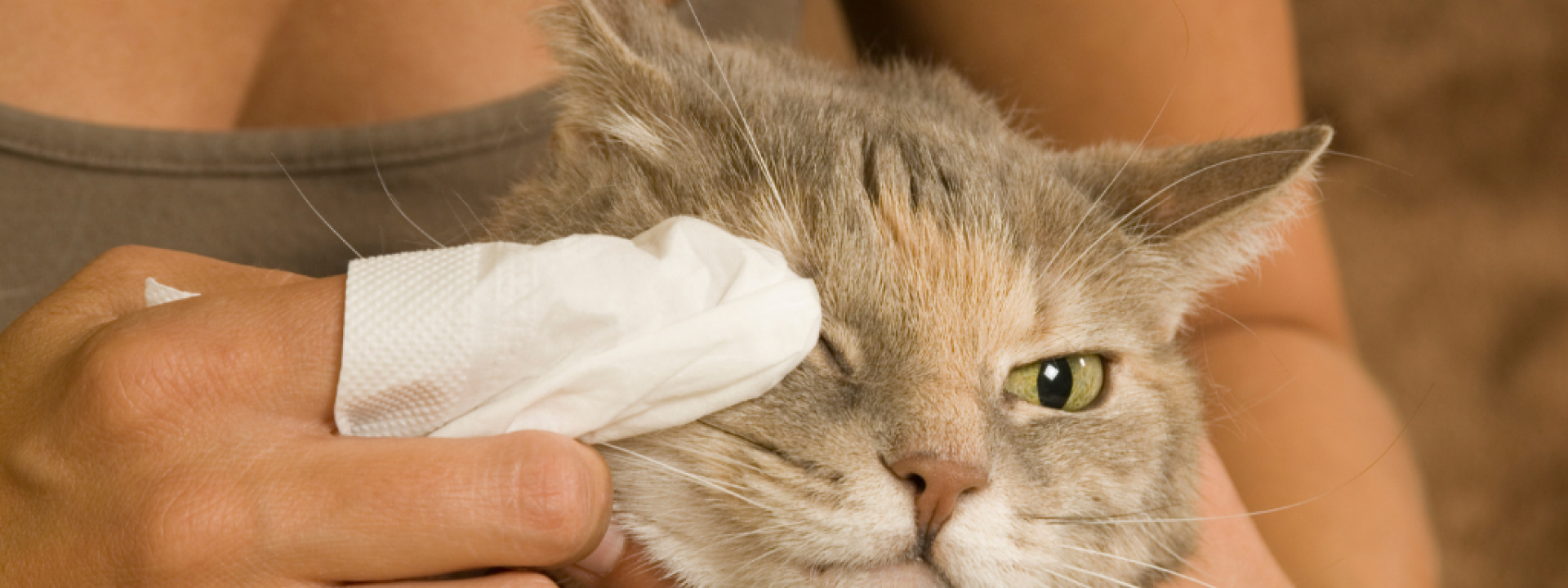Pink eye—just the term is enough to make you cringe, right? Whether it's in humans or in our cats, pink eye, or conjunctivitis, is the worst. As veterinarians, we want to make you aware of what to look out for so we can nip this painful and inconvenient cat illness in the bud. We know you love your kitty so we've rounded up some relevant facts about this condition and shared them below.
What is the conjunctiva and conjunctivitis?
The conjunctiva is the mucus membrane that covers the eye and the inside of the eyelid. Dogs and cats have an extra eyelid called the 'third eyelid' at the inside corner of their eyes which is also conjunctiva. You normally do not see the third eyelid in healthy cats but when it is inflamed it can be seen sometimes. Conjunctivitis is the inflammation of the conjunctiva.
What are the symptoms of conjunctivitis?
As with anything in cats or, really, any pets, catching a medical issue sooner rather than later nearly always ensures a better outcome. That's why it's essential that you are aware of the signs of conjunctivitis in your cat.
Symptoms of cat conjunctivitis are as follows:
- Excessive watering
- Cloudy white, yellow, or green discharge
- Pink or reddened eye rims
- Sensitivity to sunlight
- Discomfort/squinting
- Visible third eyelid
What causes conjunctivitis?
There are two types of conjunctivitis. There are infectious conjunctivitis and non-infectious conjunctivitis.
Infectious Conjunctivitis
This is when there is a bacterial, viral, or fungal infection of the conjunctiva. Conjunctivitis that starts in one eye and spreads to the other is commonly caused by bacteria or a virus. It's not common for cats to start with a viral infection and then acquire a secondary bacterial infection. A common cause of conjunctivitis is the feline herpesvirus (rhinotracheitis).
Non-infectious Conjunctivitis
This is when there is a foreign object like dust, sand, chemicals, or allergens become trapped under the eyelid. This type of conjunctivitis normally initiates a secondary bacterial infection. Some long-haired cats are born with entropion. This is when the eyelashes grow inward towards the eye and rub against the eyeball, and this causes a constant irritation. Conjunctivitis can also be a symptom of an eye tumor.
How do I know if my cat has conjunctivitis?
The signs of conjunctivitis and the appearance of the conjunctiva are usually not enough to diagnose conjunctivitis. Your veterinarian will need to review your cat’s medical history and examine your cat. In some cases, your vet will need to perform specific tests. The tests can measure eye pressure, tear production, or visualization of the cornea to rule out other conditions like a foreign body, dry eye, corneal abrasions, ulcers, or other eye injuries. Once these other conditions are ruled out, a tentative diagnosis of a bacterial infection is likely made since there is an immediate need for treatment to relieve pain and inflammation.
How long will it take to resolve cat conjunctivitis?
Most bacterial or viral infections will resolve within a couple of weeks. If your cat’s condition does not improve during treatment do not stop the prescribed treatment. If you do not see improvement or if symptoms worsen after a few days of treatment, follow up with your veterinarian. Stopping medication can cause a relapse and make it harder to resolve the infection. Further testing might be needed to get a definitive diagnosis.
What is the treatment?
If your cat has conjunctivitis but the specific cause is unknown, your veterinarian will prescribe a general treatment that contains antibiotics to control any secondary infection and/or anti-inflammatory medication to reduce pain and swelling. These will come in either drops or ointment that needs to be applied to the eye. If you have not ever applied eye medication, please ask your veterinarian to demonstrate how to apply your cat's eye medication.
Will my cat be cured of conjunctivitis?
It all depends on what has caused the conjunctivitis. If it is non-infectious and the cause is not or cannot be eliminated (i.e.: allergies), conjunctivitis will re-occur. If it is viral and incurable, like the feline herpes virus, it can persist in flare-ups during times that the immune system is compromised by illness or stress. When it comes to feline herpes, optimal wellness care, nutrition, appropriate vaccinations, supplements, and or medications can help minimize the frequency and seriousness of the relapse.
If you suspect your cat has conjunctivitis, call us right away!

